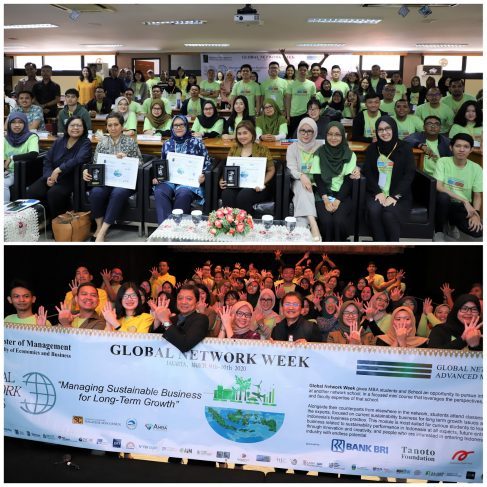GNAM Week 2020 Day 2, MM FEB UI Initiated a Visit to Telkom Indonesia
Nino Eka Putra ~ Humas FEB UI
Cecilia Puspita Wijaya and Cindy Hosea ~ MM FEB UI Students
JAKARTA – Tuesday (10/3/2020) The second day of Global Network Weeks or Global Network for Advanced Management (GNAM) with the theme “Managing Sustainable Business for Long-Term Growth” continued with interesting panels and a visit to Telkom Indonesia.
The first panel discussion discussed sustainable financing, then continued with three different sessions, including the Tanoto Foundation Overview, Sustainable Ecosystems for Startup Incubation and MDI Ventures, and Indigo Creative Nation and Corporate Venturing from the Telkom Group.
Panel Discussion: Sustainable Financing
The panel discussion with the theme Sustainable Financing was opened by Ida Ayu Agung Faradynawati from MM FEB UI, as the moderator. Kristina Lestariningsih as Executive VP of Enterprise Risk & Portfolio Management of PT. Bank Rakyat Indonesia (Persero), Tbk explained about Sustainable Finance (SF) and its application in BRI. Sustainable Finance is a service in the field of finance that integrates environmental, social and governance aspects in business decision making in companies, based on the triple bottom line principle (profit, people, planet).

Bank BRI in its efforts to implement SF has started by making a Sustainability Report since 2013, making a Sustainable Financial Action Plan (RAKB) since 2018, until the establishment of the Sustainability Board in 2019 as the party responsible for funding social and green projects supported. by BRI. In the application of sustainable financial principles, BRI implements SF practices on four aspects, namely assets, liabilities, operational, and human capital. For example in terms of assets, BRI supports businesses engaged in the field of renewable energy (renewable energy) and finance environmentally friendly modes of transportation such as MRT and LRT that use electricity, so as to reduce the greenhouse effect.
In terms of debt or liabilities, BRI implements various measures such as Anti-Money Laundering (APU), Prevention of Terrorism Funding (PPT), and supervision of Politically Exposed Person (PEP). From an operational perspective, BRI in its daily operational activities applies the paperless principle and the use of green building.

Felia Salim as a member of the Indonesia Eximbank Board of Directors (BOD) shared her experience as a member of the Green Fund Board, where in the effort to implement SF there are three principles, namely reduction, inclusion, and protection. The principle of reduction aims to reduce the gap or gap in terms of costs and risks so that the business can run well, the principle of inclusion upholds inclusiveness from people or the surrounding community, while the principle of protection refers to business goals that help protect the earth.
In the Indonesian context, Felia Salim expressed her concern for the manufacturing industry, which currently focuses more on natural resource processing and trade, and still produces less value-added products. Production in Indonesia is currently still dominated by the oil and gas sector and crude palm oil (CPO) processing. According to Felia, Indonesia needs to pay more attention to the development of a sustainable manufacturing industry to produce various value-added products. This can be supported by the application of blended finance in the management of commercial funds, namely management to mobilize capital from various commercial sources, which are used for emerging markets and environments, to have a positive impact on investors and the community.
Session 1: Tanoto Foundation Overview


Yosea Kurnianto as Deputy for SDG Academy Indonesia said the Tanoto Foundation carried out the three education life cycles above in line with Sustainable Development Growth. SDG Academy Indonesia was established in October 2019 with the aim of building a sustainable development framework, to better suit the context in which the development was carried out. This was done by SDG Academy Indonesia in three ways including leadership certification, mobile learning and study abroad.
In sessions 2 and 3, GNAM Week 2020 participants visited the world of the telecommunications industry, namely PT. Telkom Indonesia (Persero). There the participants gained knowledge and insights from the industrial world delivered by presenters who were experts in their fields.
Session 2: Sustainable Ecosystem for Startup Incubation & MDI Ventures Brief Profile at Telkom Group


The second speaker, Sandhy Widyasthana as COO / Portfolio Director of MDI Ventures stated that Telkom Group is conducting digital transformation through MDI Ventures which aims to answer questions from consumers. MDI Ventures has invested in 16 countries and has conducted six exit events. The purpose of MDI Ventures is to foster entrepreneurial spirit in Indonesia.
After that, participants are invited to visit Telkom Digital Xperience (TDX), where participants are allowed to explore the sophistication of the latest technology developed by Telkom Indonesia, such as robots with voice recognition, Artificial Intelligence, Virtual Reality, and others. Participants are also introduced and can discuss directly with several startups built by Telkom, such as Bagidata and Waterhub.
Session 3: Indigo Creative Nation & Corporate Venturing at Telkom Group



































